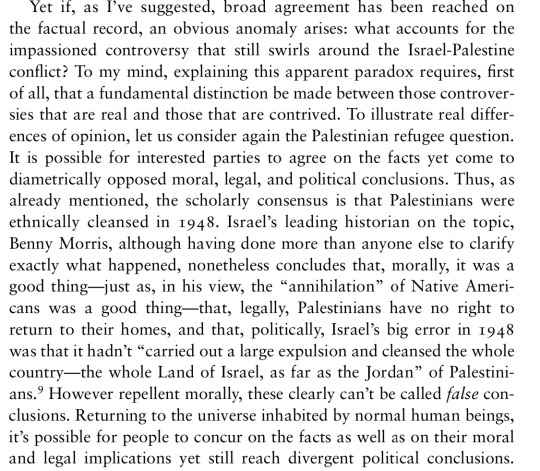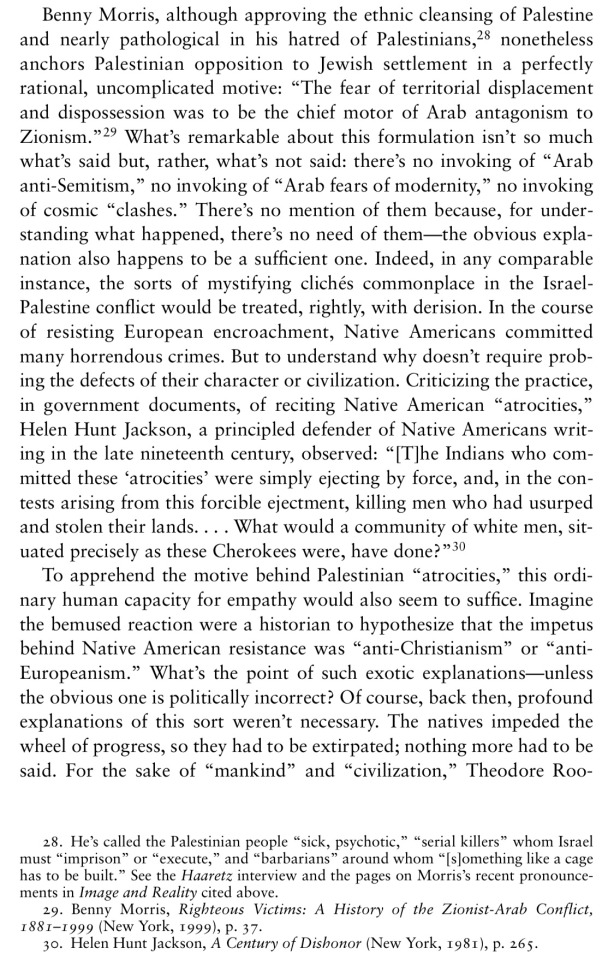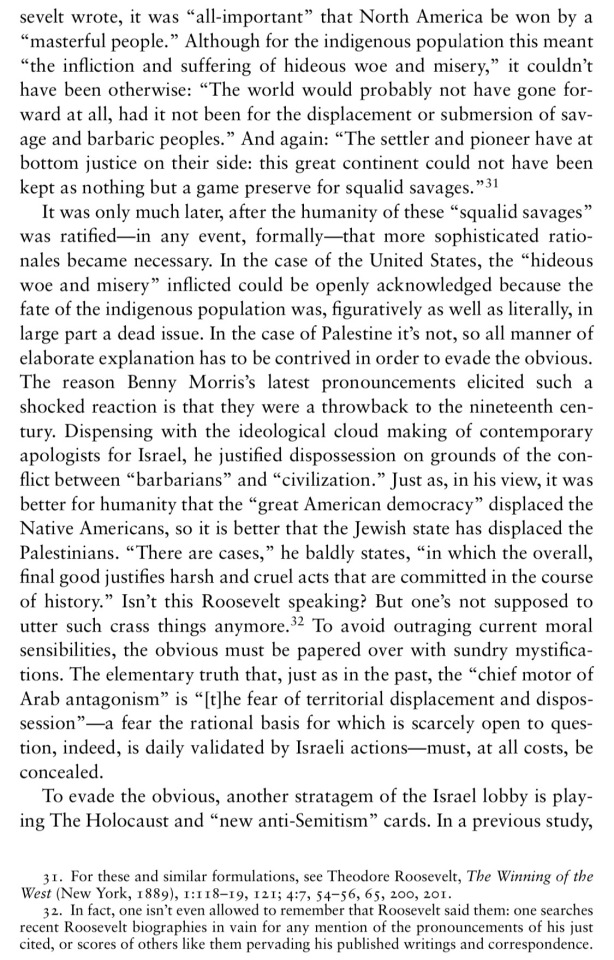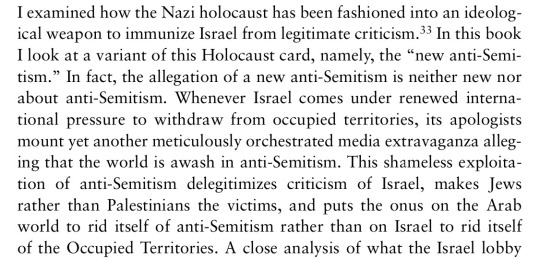#the occupation to the point of being broadly blacklisted
Explore tagged Tumblr posts
Text




— from Norman G. Finkelstein's Beyond Chutzpah: On the Misuse of Anti-Semitism and the Abuse of History (14-16) (text below)
Yet if, as I’ve suggested, broad agreement has been reached on the factual record, an obvious anomaly arises: what accounts for the impassioned controversy that still swirls around the Israel-Palestine conflict? To my mind, explaining this apparent paradox requires, first of all, that a fundamental distinction be made between those controver- sies that are real and those that are contrived. To illustrate real differences of opinion, let us consider again the Palestinian refugee question. It is possible for interested parties to agree on the facts yet come to diametrically opposed moral, legal, and political conclusions. Thus, as already mentioned, the scholarly consensus is that Palestinians were ethnically cleansed in 1948. Israel’s leading historian on the topic, Benny Morris, although having done more than anyone else to clarify exactly what happened, nonetheless concludes that, morally, it was a good thing—just as, in his view, the “annihilation” of Native Americans was a good thing—that, legally, Palestinians have no right to return to their homes, and that, politically, Israel’s big error in 1948 was that it hadn’t “carried out a large expulsion and cleansed the whole country—the whole Land of Israel, as far as the Jordan” of Palestinians.9 However repellent morally, these clearly can’t be called false conclusions. Returning to the universe inhabited by normal human beings, it’s possible for people to concur on the facts as well as on their moral and legal implications yet still reach divergent political conclusions.
[...] Benny Morris, although approving the ethnic cleansing of Palestine and nearly pathological in his hatred of Palestinians,28 nonetheless anchors Palestinian opposition to Jewish settlement in a perfectly rational, uncomplicated motive: “The fear of territorial displacement and dispossession was to be the chief motor of Arab antagonism to Zionism.”29 What’s remarkable about this formulation isn’t so much what’s said but, rather, what’s not said: there’s no invoking of “Arab anti-Semitism,” no invoking of “Arab fears of modernity,” no invoking of cosmic “clashes.” There’s no mention of them because, for understanding what happened, there’s no need of them—the obvious explanation also happens to be a sufficient one. Indeed, in any comparable instance, the sorts of mystifying clichés commonplace in the Israel-Palestine conflict would be treated, rightly, with derision. In the course of resisting European encroachment, Native Americans committed many horrendous crimes. But to understand why doesn’t require probing the defects of their character or civilization. Criticizing the practice, in government documents, of reciting Native American “atrocities,” Helen Hunt Jackson, a principled defender of Native Americans writing in the late nineteenth century, observed: “[T]he Indians who committed these ‘atrocities’ were simply ejecting by force, and, in the contests arising from this forcible ejectment, killing men who had usurped and stolen their lands. …What would a community of white men, situated precisely as these Cherokees were, have done?”30
To apprehend the motive behind Palestinian “atrocities,” this ordinary human capacity for empathy would also seem to suffice. Imagine the bemused reaction were a historian to hypothesize that the impetus behind Native American resistance was “anti-Christianism” or “anti-Europeanism.” What’s the point of such exotic explanations—unless the obvious one is politically incorrect? Of course, back then, profound explanations of this sort weren’t necessary. The natives impeded the wheel of progress, so they had to be extirpated; nothing more had to be said. For the sake of “mankind” and “civilization,” Theodore Roosevelt wrote, it was “all-important” that North America be won by a “masterful people.” Although for the indigenous population this meant “the infliction and suffering of hideous woe and misery,” it couldn’t have been otherwise: “The world would probably not have gone forward at all, had it not been for the displacement or submersion of savage and barbaric peoples.” And again: “The settler and pioneer have at bottom justice on their side: this great continent could not have been kept as nothing but a game preserve for squalid savages.”
It was only much later, after the humanity of these “squalid savages” was ratified—in any event, formally—that more sophisticated rationales became necessary. In the case of the United States, the “hideous woe and misery” inflicted could be openly acknowledged because the fate of the indigenous population was, figuratively as well as literally, in large part a dead issue. In the case of Palestine it’s not, so all manner of elaborate explanation has to be contrived in order to evade the obvious. The reason Benny Morris’s latest pronouncements elicited such a shocked reaction is that they were a throwback to the nineteenth century. Dispensing with the ideological cloud making of contemporary apologists for Israel, he justified dispossession on grounds of the conflict between “barbarians” and “civilization.” Just as, in his view, it was better for humanity that the “great American democracy” displaced the Native Americans, so it is better that the Jewish state has displaced the Palestinians. “There are cases,” he baldly states, “in which the overall, final good justifies harsh and cruel acts that are committed in the course of history.” Isn’t this Roosevelt speaking? But one’s not supposed to utter such crass things anymore.32 To avoid outraging current moral sensibilities, the obvious must be papered over with sundry mystifications. The elementary truth that, just as in the past, the “chief motor of Arab antagonism” is “[t]he fear of territorial displacement and dispossession”—a fear the rational basis for which is scarcely open to question, indeed, is daily validated by Israeli actions—must, at all costs, be concealed. To evade the obvious, another stratagem of the Israel lobby is playing The Holocaust and “new anti-Semitism” cards. In a previous study, I examined how the Nazi holocaust has been fashioned into an ideological weapon to immunize Israel from legitimate criticism.33 In this book I look at a variant of this Holocaust card, namely, the “new anti-Semitism.” In fact, the allegation of a new anti-Semitism is neither new nor about anti-Semitism. Whenever Israel comes under renewed international pressure to withdraw from occupied territories, its apologists mount yet another meticulously orchestrated media extravaganza alleging that the world is awash in anti-Semitism. This shameless exploitation of anti-Semitism delegitimizes criticism of Israel, makes Jews rather than Palestinians the victims, and puts the onus on the Arab world to rid itself of anti-Semitism rather than on Israel to rid itself of the Occupied Territories.
9. Ari Shavit, “Survival of the Fittest,” interview with Benny Morris, Haaretz (9 January 2004). For perceptive commentary, see Baruch Kimmerling, “Is Ethnic Cleansing of Arabs Getting Legitimacy from a New Israeli Historian?” Tikkun (27 January 2004); for Morris’s recent pronouncements, see also Finkelstein, Image and Reality, pp. xxix–xxx. 28. He’s called the Palestinian people “sick, psychotic,” “serial killers” whom Israel must “imprison” or “execute,” and “barbarians” around whom “[s]omething like a cage has to be built.” See the Haaretz interview and the pages on Morris’s recent pronouncements in Image and Reality cited above. 29. Benny Morris, Righteous Victims: A History of the Zionist-Arab Conflict, 1881–1999 (New York, 1999), p. 37. 30. Helen Hunt Jackson, A Century of Dishonor (New York, 1981), p. 265. 31. For these and similar formulations, see Theodore Roosevelt, The Winning of the West (New York, 1889), 1:118–19, 121; 4:7, 54–56, 65, 200, 201. 32. In fact, one isn’t even allowed to remember that Roosevelt said them: one searches recent Roosevelt biographies in vain for any mention of the pronouncements of his just cited, or scores of others like them pervading his published writings and correspondence. 33. Finkelstein, Holocaust Industry.
#norman finkelstein#beyond chutzpah#not to suggest finkelstein isn't an unproblematic person (he's very cringe on pronouns LOL) but he's dedicated his career to criticizing#the occupation to the point of being broadly blacklisted#(much like other jewish critics like ilan pappé etc)#severe trigger warning for#anti-indigenous racism#racism cw#long post /#free palestine
11 notes
·
View notes